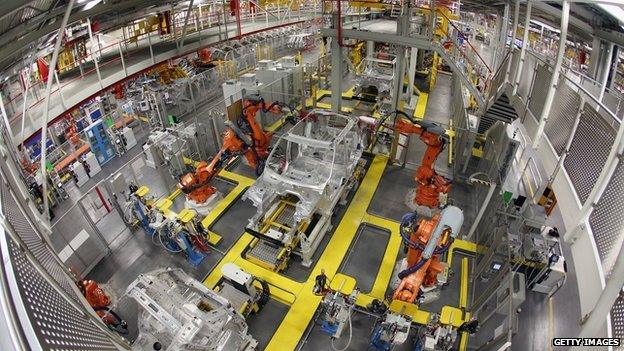Solving the productivity puzzle
- Published

The economy is perhaps the most important issue at stake in this general election. And, sitting behind the day-to-day political battle, is the less-discussed issue of productivity growth.
For the Conservatives, one of the key economic issues is reducing the UK's government deficit. Labour, meanwhile, have made living standards the key test of their policy.
As I've written before, productivity growth could well have a bigger impact on the eventual size of the UK's public sector deficit than the parties spending targets. Similarly, if one is arguing for higher living standards and faster real wage growth, then one key determinant will be productivity.
The basic facts on productivity are clear. UK productivity growth (as measured by output per hour worked) has been exceptionally weak since 2008. Productivity growth has actually been weak across the developed economies since the Great Recession but especially so in the UK.
Beyond those facts though, there is little agreement. The talk is instead of a "productivity puzzle": solving that puzzle is the key to both a lower government deficit and to higher living standards.

It may be a measurement issue. The optimistic view is that productivity is actually higher today than the official statistics are suggesting. More pessimistically, it may be that productivity growth was lower than previously thought pre-crisis.
Or it could be that the nature of Britain's recovery explains the low productivity growth. Rather than lower productivity leading to lower real wages (as companies cannot afford to increase pay), it may be that lower real wages have encouraged firms to hire workers rather than investing in new equipment. This could have lowered productivity.
Another theory is that capital is being misallocated. The Bank of England's ultra-low interest rates may have distorted the economy. Unproductive companies may have been kept alive tying up workers and capital while newer, potentially more productive, firms have been starved of lending and growth opportunities.
A fourth theory is that an important driver of productivity growth in the past - the pace of innovation - has slowed. In previous decades the UK became more efficient each year at using its stock of workers and capital to produce output. That process of gradual improvement may have slowed or ended.
As the FT notes, none of these explanations is likely to give the full picture. The puzzle remains. Against the backdrop of a divided economics profession, it is perhaps no surprise that no single party seems to have discovered the magic bullet that will boost productivity. Indeed, in all likelihood, no such magic bullet exists.
Last month Prof Karl Whelan blogged on the UK's poor productivity performance, external and noted a comment from Nobel Prize-winner Robert Solow, the father of modern growth theory.
"Every discussion among economists of the relatively slow growth of the British economy compared with the continental economies ends up in a blaze of amateur sociology."

Robert Solow, seen here receiving the Medal of Freedom from US President Barack Obama, says discussions about British economic growth end up being sociological in tone
When Solow made that comment the issue of the day was the relatively poor performance of the UK against its continental peers. The economic context is different today but the point holds.
Whether it is talk of the need for "long-termism" in company investment strategies or the debate on the quality of management or if Britain undervalues science, Solow would recognise the tone of discussion. Much of it feels more traditionally "sociological" than "economic".
But, that might be no bad thing. There is much about productivity growth that conventional macroeconomics cannot explain. The "sociological" may be harder to model but that doesn't mean it is unimportant, especially in the medium-to-longer term.
The Bank of England's chief economist Andy Haldane addressed this topic in a speech in February., external His theme was whether or not Western economies face the slowdown associated with theories of "secular stagnation". For Haldane, sociological factors (in the medium-to-longer run) may be an important driver of growth.

Andy Haldane, chief economist at the Bank of England
"Technology, by itself, was," he told his audience, "arguably insufficient to explain growth in the past. It may also be insufficient to secure growth in the future. The sociological roots of growth also matter."
Under the broad heading of "sociological factors" he listed social and human capital, inequality, infrastructure and short-termism. All of these, he argued, would have an impact.
If the sociological, broadly defined, is a real potential driver of productivity, then where does this leave the political debate ahead of May?
One potential answer is that if we are seeking to assess which party would be better at boosting productivity (and I admit few votes are decided on that particular issue), then one needs to step back and examine the manifestos as a whole.
Looking at just the two parties whom the polls suggest could form the basis of a government, two competing visions are on offer.
There is a Conservative vision of the UK becoming the most prosperous of the major economies by the 2030s, based around investment in skills and lower personal and corporate taxes. Then there is a Labour vision of attempting to learn from the experience of other more productive northern European economies, like Sweden, Denmark and Germany.
As I've argued before, sitting behind much of the current political debate is a wider debate on issues like, how flexible should our labour market be?
In the medium term it is this choice - between an attempt to change the UK's national business model into something more co-ordinated, ordered and European or embrace a flexible, liberalised economic structure - that will have most impact on the UK's productivity.
In the longer run the sociological is just as important as the economic.